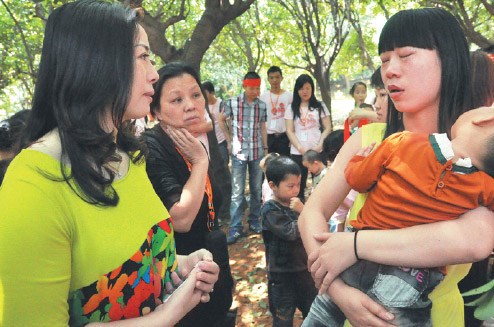
Liu He (left) talks with the mother of a child with thalassemia during a meeting for parents of children with the ailment in Changsha, Hunan province. (Photo/China Daily)
Bone-marrow transplants remain prohibitively expensive for many people
"Mom, I feel terrible. I don't want to die, please, I want the blood transfusion, please," a girl of age 6 pleaded with her sobbing mother.
She had been diagnosed with thalassemia, a hereditary blood disorder that causes anemia, increases the risk of infection and, in severe cases, can lead to heart problems.
Liu He's own daughter was waiting for a transfusion when she met the girl's sobbing mother at a hospital in Changde, Hunan province, in 2002.
It was the start of a 16-year journey that has raised millions of yuan to help hundreds of children with thalassemia.
Liu, only 26 at the time, choked back tears as the other mother told her the family could not afford the expensive treatment, let alone the follow-up care. Liu gave her several hundred yuan and told her to bring her daughter to the hospital for regular transfusions and call her for help if needed.
"Over 10 years have passed, and I've never seen that little girl again," Liu said. "Her miserable suffering touched me deeply, and I've felt great remorse for not giving more of a hand to the poor little angel at that time."
Liu has great empathy for parents whose children have thalassemia because her own daughter was diagnosed with a severe form of the disorder six months after her birth in 2001.
She was told her daughter could only be cured by a bone-marrow transplant and that regular treatment - blood transfusions, for example - would just prolong her life.
In May 2009, Liu's daughter, then 8 years old, received a transplant at Nanfang Hospital in Guangzhou, Guangdong province, after a matched donor was found at Taiwan's Tzu Chi Bone Marrow Bank in 2008.
Liu posted stories about her daughter's recovery and how to take care of recuperating patients on Tencent's QQ, a microblogging platform, under the name "Angel of thalassemia".
Her efforts gave encouragement to many parents who were afraid to send their children for transplant surgery because of the risk of failure.
Liu knew of more than 300 children in Hunan suffering from thalassemia, with many of their parents unaware of how to manage such patients or perform follow-up care.
She organized the first meeting for parents of children with thalassemia at Hunan Children's Hospital in March 2011, as well as forming a group to improve communication among affected families and help raise money for those unable to afford treatment.
"There are still many children like Xiaohua who cannot receive treatment because of poverty. I don't want the tragedy to happen again, which is why I started the group," Liu said.
"More than 100 parents joined the meeting, but we had no sponsors or charity support at the time."
With most of its members volunteers and the parents of children with thalassemia, a lack of funding was the biggest threat to the group's survival, Liu said.
But things turned around in 2014 after Liu got in touch with the Mango V Foundation, a charitable organization launched by Hunan Broadcasting System and the China Social Welfare Foundation. She took charge of its "love children with thalassemia" project in September that year.
The project had raised more than 4 million yuan ($630,000) by the end of last year, and has aided more than 300 children with thalassemia. Liu's efforts, and those of other parents, also led to testing for the disorder being included in the checklist for free premarital checkups at hospitals in the Kaifu district of Hunan's capital, Changsha, last year.
"The most important issue is to strengthen promotional activities concerning the prevention and control of thalassemia, and to take effective measures to lower the birthrate of children with the disease," Liu said.


















































